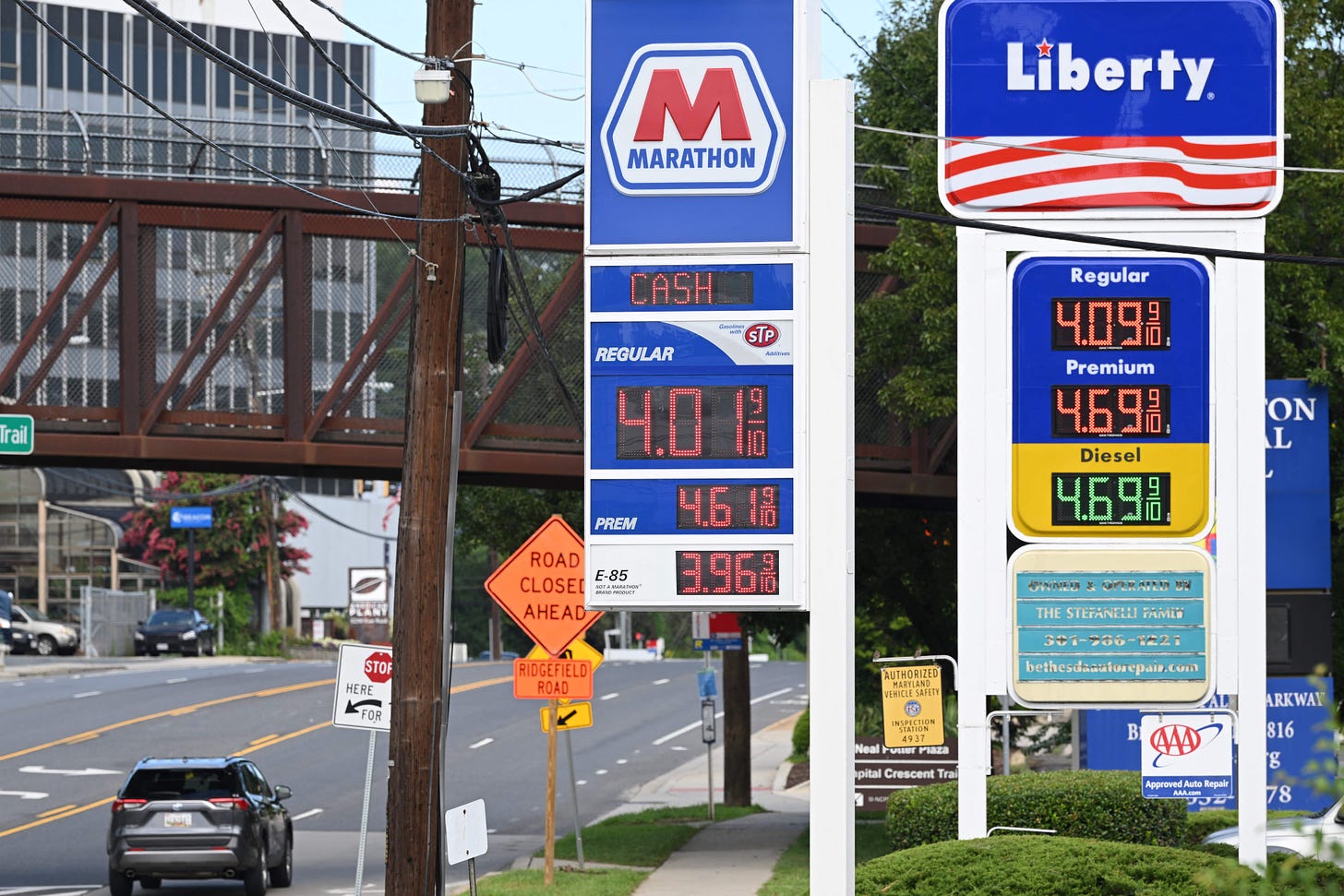Inflation Was Zero In July. It Won't Stay There.
Inflation pressures may have eased a little, but prices are still likely to rise too quickly without more Fed tightening.
Dear readers,
We got an inflation report on Tuesday, and I feel pretty good about what I wrote last Friday, ahead of its release:
Gasoline prices are coming down, which is great — they move around for reasons outside the Fed’s control. The cost pressures on various other commodities are also easing. Headline inflation was likely quite low in July. But just as the spike in gas prices was making the underlying inflation trend look worse than it actually was, the dip is now making it look artificially good. If we continue with [interest] rates where we are, inflation will certainly fall from the recent sky-high levels, but it won’t settle down at a level that the public considers normal and acceptable. The Fed still has more economy-cooling work to do.
This bore out: Inflation in July was zero, which is to say price levels in July weren’t any higher on a seasonally adjusted basis than they were in June. The headline inflation figure of 8.5% reflects that prices were that much higher in July than they had been one year earlier, but all of that increase occurred in the 11 months prior to July — the increase in July itself was zero. I repeat myself because a lot of commentators have been having feigning difficulty at understanding this distinction.
Now, that said, the July report does not indicate that we have beaten the underlying forces that have made inflation persistently too high. As I noted last week, when gasoline prices soar, that can cause the current-month inflation figure to overstate the underlying trend driving future inflation; when they plunge, that can obscure the extent to which future inflation is likely. Gasoline prices will not keep plunging forever, so do not expect ongoing zero prints, even if gas prices stabilize at a lower level.

The more important piece of hopeful news in the CPI report was that core inflation — excluding food and energy — ran at just 0.3% for the month, about half of where it had been in the recent prior months, and below market expectations. Today’s producer price index report also came in under expectations. These facts may indicate that inflation pressures are easing a bit. But, importantly, the jobs report we got last week indicated a pace of wage inflation in both June and July that was consistent with the expectation that inflation will remain significantly elevated over the medium term, even if not at the 7-8-9% level. And as Jason Furman notes, even that surprisingly low 0.3% figure means core inflation in July ran at 3.8% annualized — still quite a bit more than the Fed’s 2% target.
I think a lot of the commentary about inflation news, as with the commentary about whether we’re in a recession, is excessively focused on the question of how voters will feel about hearing certain numbers and declarations. I think that conversation is mostly unimportant, just as I thought it was unimportant when the inflation numbers looked worse and the growth numbers looked better. High gas prices make voters mad because they buy gas, not because they hear about gas prices in the news. Soaring gas prices were bad for Biden’s political standing, no matter what the press said about them, and plunging gas prices will help his political standing, regardless of what people read in the paper about the inflation rate.1
The questions I do think matter a lot — are underlying inflation pressures still high? how much is the economy cooling off? — matter because of how the answers to them will affect macroeconomic policy choices. While we have had two negative quarterly GDP prints, other aspects of the recent economic data picture — strong job growth, strong wage growth, approximately flat consumer spending, and a positive figure for first-quarter gross domestic income growth, even though GDI and GDP are theoretically supposed to be equal — do not reflect an economy that has tipped into recession. And this week’s inflation news makes me only modestly less concerned about inflation. Put those observations together, and that means it’s still time for the Fed to keep tightening quickly, and it’s not time for new fiscal expansions like student debt forgiveness.
Very seriously,
Josh
Does Biden deserve credit for falling gas prices? I doubt his scolding of gas station owners to lower gas prices did anything. But I do think diplomatic efforts led by Treasury Secretary Janet Yellen to walk Europe back a bit from the most extreme version of the energy embargo it might have imposed on Russia were important for moderating global oil prices. (I discussed those negotiations last month with Margarita Balmaceda on the Very Serious podcast.) I also think the administration’s commitment to refill the Strategic Petroleum Reserve even at elevated future prices provides useful encouragement for domestic oil production. And over the medium term, the agreements Joe Manchin extracted from more liberal Democrats in exchange for his support for the Inflation Reduction Act will make it easier to produce and transmit energy, including in oil and natural gas form, across the United States.




Josh, I’m interested to hear your take on Stefanie Kelton’s viewpoint. As much of our inflation is being caused by supply issues, she has postulated that raising interest rates, while slowing consumer demand, would also deter companies from increasing capacity, furthering our supply issue and causing inflation to continue. Thoughts?